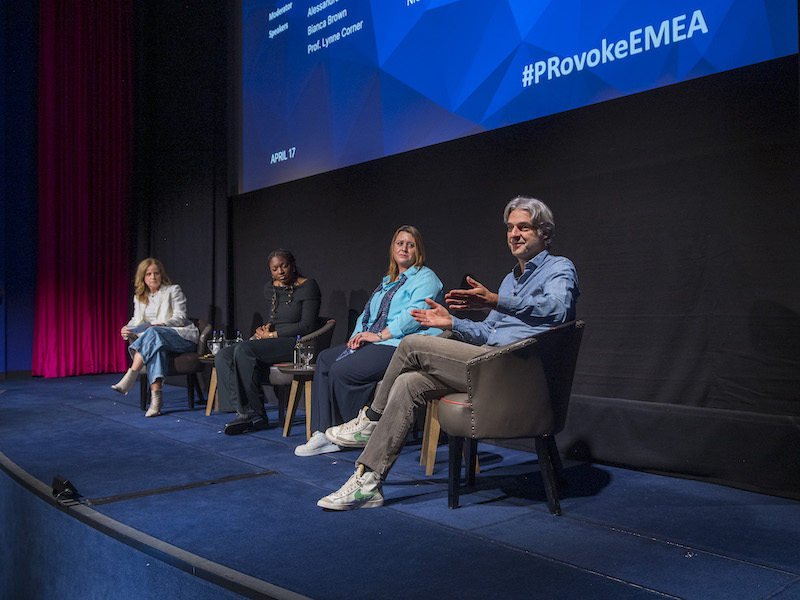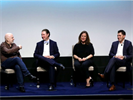Maja Pawinska Sims 23 Apr 2024 // 3:06PM GMT

LONDON — Brands must work harder to debunk misconceptions about younger and older consumers and understand not only that there is more that connects the two generations – including their , but that they are both critical in terms of influence and spending power, according to speakers at the EMEA Summit last week.
Jackie Cooper, Edelman’s global chief brand officer, opened the session by outlining the work the agency was doing with younger and older consumers, via its Gen Z Lab and its new Longevity Lab, which works with consumers aged 55-72.
“Generational influence is important to understand in a world of immense change, and lots of CMOs are very fearful of Gen Z: their ability to criticise and cancel can paralyse CMOs in making decisions. And there’s so much economic potential for one of the most overlooked generations, aged 55-72 – despite representing half of global spending, only 5-10% of campaigns are aimed at that generation.”
Bianca Brown, a Gen Z panellist representing Edelman's digital practice, said one of the biggest misconceptions about Gen Z was their level of activism: “We’re not all raging activists, and we’re not all angry. We do have strong societal beliefs and opinions but, like any other generation, the way we act on those beliefs presents differently.”
Brown also said that purpose was “still very much a hot ticket” for Gen Z: “You can’t speak to Gen Z within having some sort of element of purpose, social impact, or a point of view on the world. As a generation, we are so vocal about our beliefs – we have inherited a context that we are very aware of and critical and sceptical of. A brand that can recognise how they can make change for good and make younger or older people feel seen is vital for not only gaining attention but keeping it, inspiring trust and loyalty.
“Any communications campaign where you are trying to speak to a person, where you are trying to change behaviour and opinions, has to be very cognisant of the context you’re speaking to and the threat your audience is existing in. Gen Z will celebrate a brand that expresses a point of view and stand 10 toes down in it.”
At the National Innovation Centre for Ageing (NICA), which works with Edelman on the Longevity Lab, deputy director and COO Lynne Corner mirrored this with the “myths and misunderstandings” about older generations: “One of the biggest is that this is all about retirement and decline, when it’s about opportunity, reinvention and reimagining.”
Corner emphasised the diversity within the over-50 demographic and stressed the importance of recognizing their economic influence and the values they share with Gen Z. “The ‘over-50s’ is not something you can group easily together, it’s the most diverse generation and as they get older they’ve had time to hone their preferences and priorities and really think about issues.
“So many older people are dismissed, but they have so much knowledge, ideas and creativity, and as a society we’re not harnessing that imagination and look at generational solidarity. Older people have a contribution to make, but don’t have the products and services to live life to their greatest potential. As we have more older than younger people in the world, valuing age is not just important but urgent and imperative.”
Corner added: “We’ve never in human history had five generations living together – it’s about making sure people have opportunities to live their best possible life and to reinvent another life. If brands take on a customer at 50, they could have another 50 years with them. It’s also about making sure that people can see all ages, generations and cultures together, and emphasising that there more that connects us than what separates us. It’s about transitioning through life in different stages and that positive narrative, as opposed to being about decline.”
The panel also featured Alessandro Manfredi, chief marketing officer at Dove, who agreed there were parallels between Gen Z and older consumers, in terms of their values and global outlook: “These two cohorts are very similar in the way they look at the world. They really value brands that have a social point of view.”
Manfredi underlined the significance of aligning brand messaging and action with societal values, citing Dove's longstanding commitment to promoting body confidence across generations via its 20-year-old Self-Esteem Project: “The Dove brand transcends different age groups because it is based on a fundamental human truth that a narrow definition of beauty creates pressure on women and their body confidence and this affects their self-esteem.”
He also stressed the need for brands to cultivate authentic, long-term relationships with influencers based on shared values: “Every brand now works with influencers. But you need to ensure it’s not just a transactional relationship but a real, long-term relationship based on shared values.”
The panel also discussed Dove's 'Code my Crown' campaign, developed with Edelman, which addressed the lack of diversity in gaming avatars by creating an open-source guide to coding Black hair.
Manfredi said: “This is a case of where we scan the opportunities of what we could be doing as a brand, look at different cultures and communities, and what are the biggest threats to girls’ body confidence. In gaming, where half of players are female, there’s a big lack of diversity of representation – we realised the Black female population have even less representation because of a technical problem. You can’t do campaigns if you don’t do something about the problem, you have to be part of the solution. This is a brand ‘do’, not just a campaign – it’s an action we took to enable more diversity.”
Brown said that consulting on ‘Code my Crown’ was had resonated with her personally: “It was such fulfilling and inspiring work: thinking about when I was younger and playing games and no avatars looked like me, and now being able to affect change in a real way with such a familiar brand. It shows the importance of finding that specific human truth, not just in a community but in a real niche. It’s timely and also timeless.”
In conclusion, Manfredi said: “I really think every business, every brand should have a mission, purpose or values system – call it what you want – because it’s critical to not only have a positive impact on society but to stand out and build very deep emotional connections with consumers and customers when it’s getting harder and harder to differentiate brands and connect in the media environment today.
"It's also critical for brands to be a compass in difficult times: if you have a values system it’s much easier to know what you have to do in an unpredictable world. It’s compatible with profit and is actually a fantastic accelerator of growth, when it’s done well.”


































.jpg)

















